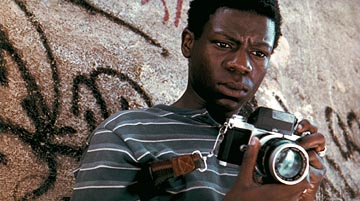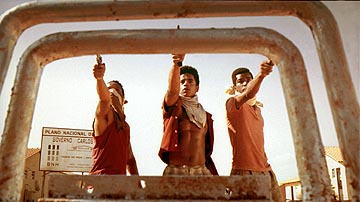City of God
(Cidade de Deus)


Brazil's entry for the 2003 Academy Award for Best Foreign Film is City of God, a searing, violent look at gangs in the notorious favelas, or slums outside Rio. The City of God housing project is one of the more notorious ones, and the events depicted in the movie, based on the novel by Paulo Lins and adapted by Braulio Mantovani (Palace II), seem even more brazen given that it is based on a true story. City of God takes place over fifteen years, and weaves together a myriad of interconnected stories to give a complex, multilayered look at life in the slums, and the bleakness and hope that arises from it. The two main characters are Rocket (Alexandre Rodrigues, Palace II) and Lil' Ze (Firmino da Hora), two people that live close to each other but are complete opposites. Rocket narrates City of God, and according to him, the story of the slum is the story of some of its inhabitants.
The first thing director Fernando Meirelles (Palace II, Maids) did to lend an air of authenticity was to film in an actual favela. He hired people off the street, and had to get the permission of some of the drug dealers in order to film. So when he has small children on screen indifferently murdering people with guns, it is a searing image that is hard to forget. Co-director Katia Lund (Palace II, Minha Alma) was infinitely helpful here, since she had experience in the favelas. Hiring non-actors gave City of God a raw, realistic feeling, and Meirelles uses a kinetic style of filming to make everything seem gritty. He uses some interesting camera tricks to make the transitions between eras more fluid.
Rocket wants to be a photographer. He sees this as his way out of the slums. The City of God is his home, but it's like he stands apart. He hangs with the hippie crowd, and the people around him know he is harmless. Lil' Ze is the exact opposite. Ever since he was a child, he wanted total control, and over the years ruthlessly killed his way to the top. On a paradoxical level, he brings a sense of control and even safety to the slum. He doesn't want the gang members stealing from slum residents, but to get on the wrong side of his temper is usually fatal. His childhood friend Benny (Philippe Haagensen, Palace II) is the only voice of reason in Ze's organization.
City of God is not the type of film the Academy usually recognizes. It is not necessarily a shiny, happy film and isn't a costume drama. It revels in violence. Yet it does have an epic scope to it, and is extremely engrossing. The decision to tell the story in chunks of smaller stories is an interesting one. It puts a very human face on all of the horrific events that happen. It also serves to place things in perspective by showing how events in the past affect and change people in the present. It's strong storytelling by Meirelles and certainly deserves to be seen.